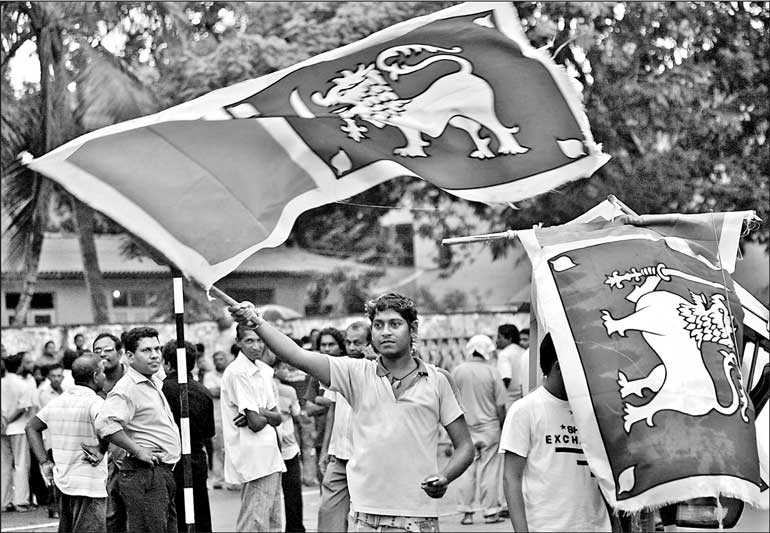Friday Apr 04, 2025
Friday Apr 04, 2025
Saturday, 25 January 2020 00:02 - - {{hitsCtrl.values.hits}}

A post-Colonial introspection at how we grow our food, what we eat, what we consider ‘education’, ‘medication’, and ‘patriotism’
By Suryamithra Vishwa
On 4 February 1948, the British formally ended their Colonial occupation of this country and granted us ‘independence’. But from then to now, have we had the assertiveness to reclaim our lost identity as a nation, translated into everyday living values, skills and way of thinking that make us who we are?
Last week this writer had to meet a few Lankan academics regarding some event and prior to the meeting, they mistakenly identified me with a western university, and when I categorically stated that I was educated fully in Sri Lanka and affiliated only with Sri Lankan universities, there was a pall of disappointed silence. During the discussion, what I could observe was the rote use of theories, a disconnectedness with the practical use of knowledge and the absolute absence of seeing knowledge as a route to create wellbeing in society. Instead palpably apparent was blind pride and a hero worshipping of western theories without even understanding the rationale behind them.
Shortly after in separate conversation with a few committed Lankans who have contributed greatly to this country, such as Daya Dissanayake, award-winning bilingual Lankan novelist, poet and blogger, Engineer Dr. Chandana Jayawardena, who has extensively studied Lankan indigenous construction and irrigation methods, and Lankan chef Publis Silva, who has for 60 years strived to revive our indigenous diet, what pre-occupied us in our discussion was how far we have traversed away from ourselves in our national policies (or lack of it) for the past decades.
Speaking of the craze for ‘foreign’ qualifications, the hilariousness of Sri Lankans with our hydraulic civilisation going to the US to study irrigation was raised. In a detailed discussion with Daya Dissanayake on the topics of education and identity, he very proudly revealed that he never went to university – possibly the reason behind his unsullied and razor sharp intellect. Instead he identified a long list of libraries as ‘his universities’ and engaging in a detailed discussion on several themes, it was apparent that few foreign qualified ‘professors’ will be able to match him in his ability to dissect an issue and analyse it from various perspectives based on a vast accumulation of research-based knowledge pursued for the love of it, and not for a title.
In the brief discussion with chef Publis, who has written many books trying to revive our ancient cuisine that assures a healthy life, he mourned how our entire nation has become akin to one large hospital.
With only a few days to celebrate our independence day, let us ask ourselves some uncomfortable questions and ascertain what we can conclude from the answers.
(Suryamithra Vishwa is a Sri Lankan who strives to transcend beyond inherited birth identity. She is the founder of the thought movement ‘Earth Life Water Knowledge Trails Lanka’, and has a keen interest in comparative spirituality and indigenous knowledge. Her academic training has been in sociology, and she is a curriculum writer and visiting lecturer in Mass Communication at a national university in Sri Lanka under her inherited family name. Her library of 20,000 books, of which a large number is on global literature, science, comparative religions, and secular spirituality, has been opened up for the public free of charge. Those interested in borrowing any book could contact 0812494285.)
Discover Kapruka, the leading online shopping platform in Sri Lanka, where you can conveniently send Gifts and Flowers to your loved ones for any event including Valentine ’s Day. Explore a wide range of popular Shopping Categories on Kapruka, including Toys, Groceries, Electronics, Birthday Cakes, Fruits, Chocolates, Flower Bouquets, Clothing, Watches, Lingerie, Gift Sets and Jewellery. Also if you’re interested in selling with Kapruka, Partner Central by Kapruka is the best solution to start with. Moreover, through Kapruka Global Shop, you can also enjoy the convenience of purchasing products from renowned platforms like Amazon and eBay and have them delivered to Sri Lanka.
Discover Kapruka, the leading online shopping platform in Sri Lanka, where you can conveniently send Gifts and Flowers to your loved ones for any event including Valentine ’s Day. Explore a wide range of popular Shopping Categories on Kapruka, including Toys, Groceries, Electronics, Birthday Cakes, Fruits, Chocolates, Flower Bouquets, Clothing, Watches, Lingerie, Gift Sets and Jewellery. Also if you’re interested in selling with Kapruka, Partner Central by Kapruka is the best solution to start with. Moreover, through Kapruka Global Shop, you can also enjoy the convenience of purchasing products from renowned platforms like Amazon and eBay and have them delivered to Sri Lanka.